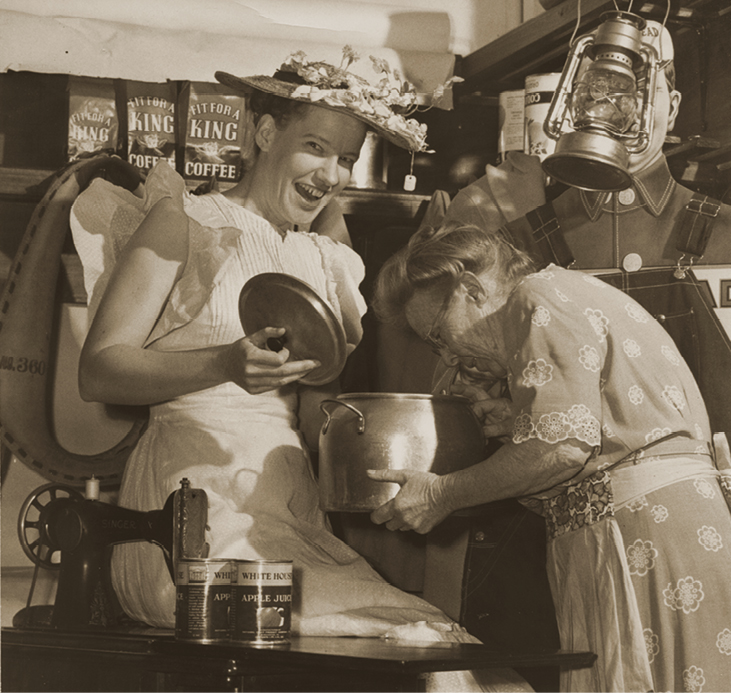By GayNelle Doll
On March 13, 1897, a curious event unfolded in Vanderbilt’s gymnasium. Although the student body was almost exclusively male, only women were allowed entrance to the building that morning. Windows were blocked to shield activities within from prying eyes.
Inside, young women in bloomers and capacious blouses began a rousing game of basketball. The sport had been invented five years earlier, and Vanderbilt men played their first game in 1893.
Now it was the women’s big moment. A crowd of females watched as Stella Vaughn led her team in a contest against the young ladies of Ward Seminary. The game remained scoreless until the last seconds, when Vaughn threw a long pass to a teammate. Elizabeth Buttorff lobbed a shot into the basket. The Vanderbilt women won their first game, and with that, Stella Vaughn launched her career as their first basketball coach.
Few people in the university’s history have been as loyal to Vanderbilt as long and as selflessly as Stella Scott Vaughn. She grew up on campus and was one of Vanderbilt’s earliest woman graduates. She served as the university’s first female physical-education instructor and coach, working her first nine years without pay. She also took on the unofficial role as dean of women students. Before Vanderbilt had a women’s dormitory, “Miss Stella” boarded female students in her Highland Avenue home for more than 30 years. And she functioned as university historian.
Multitasking was in Stella Vaughn’s DNA. Her father, William J. Vaughn, joined the Vanderbilt faculty in 1882. He taught mathematics and astronomy, served as the university’s librarian, and founded the Vanderbilt chapter of Phi Beta Kappa.
Vanderbilt Chancellor Landon Garland recruited William Vaughn after getting to know him at the University of Alabama. Among the enticements at Vanderbilt was a home on campus. Stella, the only girl in a family of five children, was 10 years old when the family moved to Nashville. She attended a one-room school for faculty children on the edge of campus.
“Bishop [Holland] McTyeire used to take me by the hand and walk along the paths telling me the names of many of the trees whose growth he watched with keen interest,” she would recall later. “The bishop was very fond of children, and whenever a snow fell he would get out his one-horse sleigh and drive from house to house picking up the little folks. All [who] couldn’t get in the sleigh hung their sleds behind [it] for his horse to pull.”
In 1892, Stella Vaughn entered Vanderbilt as a freshman. She was one of 10 female students in the Academic Department. Admitted “by courtesy,” women would not be allowed to matriculate formally for another four years. After her 1896 graduation Vaughn remained on campus to teach women’s physical education and formed a women’s basketball team, serving as coach and team captain.
In 1905, Vaughn was granted a salary of $100 a year. In 1913 it climbed to $200 a year. “She has not only taught them in the gymnasium, but has supervised their sports and in a general way has acted as adviser and friend,” said Chancellor James Kirkland in recommending the increase.

For decades Stella and her brother Harry Vaughn, DDS 1894, filled scrapbooks with newspaper clippings about Vanderbilt, dating back to its founding. Two years before her death, the siblings donated 26 volumes of their clippings books to the library.
Stella Vaughn was 88 when she died in 1960. Three years after her death, Vanderbilt named a dormitory in Branscomb Quadrangle the Stella Vaughn House. In 1987 the Vanderbilt Board of Trust voted to name her father’s longtime campus residence The Vaughn Home. It currently houses the Robert Penn Warren Center for the Humanities.
Earlier this year Mona Frederick, longtime executive director of the Robert Penn Warren Center, and Laura Carpenter, associate professor of sociology, produced a short video about Vaughn with funding by the Vanderbilt Institute for Digital Learning.
“Although that first basketball game was played behind closed doors, Stella Vaughn continued to open doors for women throughout her long association with the university,” says Frederick.
Today, 10 of the university’s 16 varsity athletics teams are for women’s sports. Two of three NCAA championships claimed by Vanderbilt have been won by women (bowling and tennis). This year women earned Founder’s Medals for the highest academic achievement in eight of Vanderbilt’s 10 colleges and schools.
“The girls at Vanderbilt have worked against the odds,” Stella Vaughn once remarked, “but they are a ‘plucky bunch’ and not easily discouraged. They have slowly but surely won a place for themselves by their perseverance.”
Vaughn was inducted into the Vanderbilt Athletic Hall of Fame in 2015.
GayNelle Doll, a native Iowan, is the former editor of Vanderbilt Magazine. After nearly 30 years as an editor and manager of Vanderbilt publications, she retired in 2015 and continues to live in Nashville.
Watch the Vanderbilt video produced this year about Stella Vaughn: